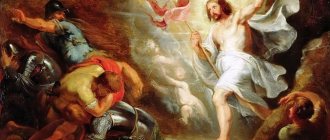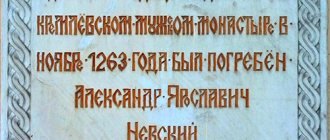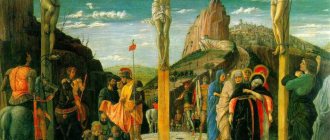To understand whether God exists, you must first decide what God is. If we take clearly formulated definitions (for example, from dictionaries), then it is possible to prove the presence or absence of a God corresponding to these definitions. Such definitions are usually accepted by most people. If a person invents his own and maximally non-specific definition, then it is impossible to prove either the presence or absence of such a God, since if we get a conclusion about the presence or absence of God, the definition may change and then we will not receive an answer to the question. As is the case with the truth of the scriptures, in this article we will primarily consider the problematic of the existence of the Christian God.
In addition, it is difficult to prove the non-existence of even the most incredible entities - for example, a porcelain teapot flying around the Sun or unicorns, so it is necessary to prove the existence of God. However, we can summarize the indirect evidence of its existence or absence, and based on their correlation, conclude that it exists or does not exist with an extremely high probability.
What is God
According to the Great Russian Encyclopedia, God is the Supreme in the religions of the world, creating and arranging the world, giving things, beings and persons their existence, measure, meaning and law. Religious teachings, united by the principle of theism, affirm the personal existence of the Supreme, his personal relationship (love) to created beings and the cosmos as a whole, his dialogical self-disclosure in acts of Revelation1. Ozhegov’s dictionary says that this is the supreme omnipotent being who rules the world or (in case of polytheism) one of such beings2. The most complete list of definitions is provided by the Merriam-Webster dictionary, among which there are those that interest us:
1. God is the supreme or basic entity. For example:
A: A being of absolute power, wisdom and virtue, who is worshiped (in Judaism, Christianity, Islam and Hinduism) as the creator and ruler of the Universe;
B: The incorporeal divine power ruling over all as the eternal Spirit, the infinite mind (in Christian Science);
2. A being or object that is worshiped as having supernatural qualities and abilities; one who controls a certain aspect or part of reality3.
The Orthodox Encyclopedia does not give a clear formulation of what God is, but it lists a list of qualities that he possesses: he is alive, omnipotent, virtuous, merciful, wise, he is the creator of the world and can control the events that take place in it4. We can thus conclude that God is a being who is the creator and ruler of the Universe, omnipotent, virtuous, merciful, wise.
Absence of a “black swan”
As you know, the statement “all swans are white” can be refuted by the first example of a black swan. The thesis that God does not exist can be refuted by the very first indisputable evidence of his existence - the recorded manifestation of God’s activity and evidence of his involvement in this activity. Roughly speaking, if God appeared to people once and demonstrated supernatural action, it would disprove claims that he does not exist. If this were clearly stated, the question of the existence of God would be settled once and for all. But we don’t have such a “black swan”. In the article on the truth of the scriptures, we already noted that there is no reason to believe that Jesus Christ performed any miracles. And the absence of any practical data that would confirm the existence of God is an argument in favor of his absence.
If I were to assert that a porcelain teapot revolves around the Sun in an elliptical orbit between the Earth and Mars, no one would be able to refute my statement, if I added prudently that the teapot is too small to be detected even with the most powerful telescopes. But if I had further stated that since my statement cannot be refuted, a reasonable person has no right to doubt its truth, then I would rightly be shown that I am talking nonsense. However, if the existence of such a teapot was affirmed in ancient books, its authenticity was repeated every Sunday, and this idea was drummed into the heads of schoolchildren from childhood, then disbelief in its existence would seem strange, and the doubter would seem worthy of the attention of psychiatrists in the enlightened era, and earlier - attention Inquisition5.
Bertrand Russell
Nagarjuna - reality and unreality
Nagarjuna Statue in Scotland
A few hundred years after the death of Siddhartha Gautama, another Buddhist philosopher, Nagarjuna, pondered the question: can we even find differences between the ideal and material worlds and tell what is real and what is not?
Let's take for example the already mentioned hydrogen atom. Since this atom is just an illusion generated by the interaction of a proton and an electron, and exists only in our head in the form of an idea, it means that it is not part of the material world, which means it is unreal. But everything else in our world is built from atoms—molecules, cells, organisms, planets—and is a collection of layers of abstractions of component ideas. This means that all material things are also unreal. Moreover, even the very nucleus of an atom, the proton, is a composite illusion of the interaction of quarks, and an electron spinning in orbit around a proton can be represented as an illusion generated by the interaction of physical forces described by mathematical formulas. That is, the parts of the atom are also illusory and unreal and exist only as an idea in our head.
Even such a seemingly fundamental property of our Universe as time is just an illusion. We divide time into past, present and future. The past is defined in relation to the present and the future, the future is defined in relation to the present and the past, and the present is defined in relation to the past and the future. The past no longer exists, the future has not yet arrived. So where then is the present - that very moment between the past and the future? Between that which no longer exists and that which does not yet exist. This means that the present and time itself are just as “empty” as everything else.
Of course, in the time of Nagarjuna, they had not heard of quarks, but having analyzed in a similar way all the things and phenomena known to him, the philosopher came to the conclusion that nothing real and material exists at all, that all matter is just ideas and impressions in our consciousness, and therefore the material and ideal world are one and the same. Developing this idea, Nagarjuna came to thoughts very similar to the thoughts of the famous 20th century Austrian philosopher Ludwig Wittgenstein that our language, in principle, cannot adequately describe reality, and all our philosophy is not reasoning about the world, but reasoning about our ideas about world. A spoken thought is a lie. Everything that is real is indescribable, everything that is described is unreal, and no other reality exists except the world of ideas.
Experimental tests
In 2006, the American Heart Journal published the results of one of the so-called “prayer experiments”6. It was funded by the Templeton Foundation and aimed to establish that prayer for the sick promotes their recovery. Dr. Herbert Benson and his team examined 1,802 patients who had undergone coronary artery bypass grafting at six hospitals. The patients were divided into three groups. Prayers were offered for the patients of group 1, but they did not know about it. No prayers were offered for patients in group 2 (control), and they also did not know about it. Patients of group 3 were prayed for with their knowledge. Based on the results of the condition of patients in groups 1 and 2, the effectiveness of prayer for help was determined. The condition of patients in group 3 indicated possible psychosomatic effects on patients of the knowledge that they are being prayed for. The prayer was held by the congregation of three churches: in Minnesota, Massachusetts and Missouri; all three churches are at a considerable distance from three hospitals. It is customary for scientific experiments to be carried out with the greatest possible degree of standardization, so all worshipers were asked to include in the prayer the phrase “for a successful operation and a quick recovery without complications.”
As the results of the experiment showed, the condition of the patients for whom prayers were offered was no different from the condition of the patients for whom prayers were not offered. There was a difference in the condition of those who knew that they were being prayed for, and patients from both groups who did not know about it - but it also turned out to be the opposite of expectation. Patients who knew that prayers were being offered for them had significantly more complications than those who did not know about it. It is likely that the patients for whom they were praying were exposed, due to their awareness, to additional stress—“actor anxiety,” as the researchers call it.
In addition, Charles Darwin's cousin Francis Galton noted that every Sunday in all English churches all parishioners offer a joint prayer for the health of the royal family. Based on this, one would assume that the members of the royal family are in exceptionally good health. Galton conducted a study7 and did not find statistical evidence for this - for example, the average life expectancy in the royal family turned out to be even shorter than the national average.
If God were virtuous, merciful and in control of the world, most likely he would hear prayers and such experiments would have different results. But it seems that it cannot meet all these criteria at the same time (that is, in the sense in which it is defined, it does not exist).
Other forms of manifestation of the Almighty.
IN ADDITION TO THOSE DESCRIBED AND SHOWN ABOVE, THERE ARE OTHER FORMS THAT THE SUPREME PERSONALITY OF GOD TAKES.
When the Almighty was born (incarnated) on Earth 5 thousand years ago (in the form of “Krishna”), He first appeared before His parents in a four-armed form. But His parents got scared, prayed, and Krishna took on his usual two-armed human form. But subsequently, to his friend Arjuna, at his request, He ( Krishna ) showed His four-armed form, in an instant appearing before him in this form, then again taking on the usual human form.
TO ENLARGE A PHOTO, MOVE THE CURSOR (ARROW) OVER THE PHOTO AND CLICK THE LEFT MOUSE BUTTON.
By the way, this is proof of the incarnation of the Almighty, which can be used to test any charlatan who will claim that he is “the incarnation of God.” As proof, he must demonstrate the four-armed form of God (the Supreme).
There is a spiritual practice - “mystical yoga”, which is now practically lost and not practiced. By properly performing meditation on a specific form of the Supreme, a yogi will be able to achieve mystical perfections. Such as: acquiring the property of levitation (elimination of the law of gravity), moving your body in space a certain distance in the shortest moment of time. A yogi who achieves perfection in spiritual practice can leave his physical body and go to other planets with highly developed civilizations. This type of spiritual practice has practically been lost in modern times. When engaging in this type of spiritual perfection, a person must devote all his time to this activity, completely abandoning communication and life in modern society. Yoga classes (performing various asanas (positions), exercises), which are known in the Western world, represent only the initial stage of this complex spiritual practice. The result of performing well-known various yoga exercises will only be calming the mind and the proper functioning of the body as a whole.
So, in order to achieve truly mystical perfection in engaging in this type of spiritual practice, the yogi meditates on the form of God (the Supreme) located in the area of his heart. This form also represents the four-armed form of the Almighty, measuring about 20 centimeters. This four-armed form of the Supreme is exactly the same as the one in which God (the Supreme) resides in the transcendental (spiritual) universes.
TO ENLARGE A PHOTO, MOVE THE CURSOR (ARROW) OVER THE PHOTO AND CLICK THE LEFT MOUSE BUTTON.
TO ENLARGE A PHOTO, MOVE THE CURSOR (ARROW) OVER THE PHOTO AND CLICK THE LEFT MOUSE BUTTON.
All people deny the existence of gods
In total, there are about 4,300 different religions in the world,8 so any believer is an atheist in relation to thousands of religions, and will go to hell in at least dozens of religions. If thousands of other religions have a wrong idea about God, there is a high probability that a representative of a particular religion also has a wrong idea about him. This argument comes from historian Stephen Roberts, who said:
I think we are both atheists. I just don't believe in one less god than you. When you understand why you reject all other possible gods, you will understand why I reject yours9.
Indeed, the probability of the existence of the Greek Olympian gods and, say, the Christian God is approximately the same. And most likely, if you exclude the existence of 4000 Gods instead of excluding the existence of 3999 Gods, the difference will be insignificant.
Adviсe
- You don't have to argue about the existence of God with every believer you meet. Good friends don't have to argue with each other about everything. If you're always picking an argument with a friend or trying to get them on your side, be prepared to have one less friend.
- Many people choose religion to try to overcome a difficult stage in life, such as addiction or the tragic death of a loved one. Although religion can positively influence a person's life and help him in times of need, this does not mean that the ideas behind the religion are true. If you meet someone who claims that religion has helped them, be careful not to offend them. You don't have to avoid this person or pretend to understand him.
Paradoxical
The very idea of God and many of his qualities is largely paradoxical. As a rule, in this regard, the paradox of omnipotence and the paradox of omniscience are most often recalled. The paradox of omnipotence goes like this: can God create a stone that he cannot lift10? Like the concepts of freedom and tolerance, the concept of omnipotence contains a paradox, because if someone can do absolutely everything, then it turns out that he is able to do what is impossible to do. It turns out absurd. God cannot do what is impossible to do, because if he does it, that action will no longer be impossible. And, therefore, God cannot do everything. That is, there must be some specific list of what God can do, because there are many things that he cannot do (for example, create a prison from which he cannot get out).
The paradox of omniscience, or the paradox of omniscience, is this: does God have freedom of choice if he knows the future? After all, if God knows the future, then he either cannot change it, and then he has no power even over himself, or he can change this future, but then he cannot say exactly in advance what will happen in the future, and then he does not know the future. Sometimes you can hear the version that God's omniscience consists in knowing all the options that can happen, but in this case he does not know which one will happen, and then he is not omniscient.
Another problem we can look at is that if God is omniscient, omnipotent, and morally perfect, he would create perfect beings instead of imperfect beings like humans. But why create people as we see them today? Either due to insufficient knowledge, or due to the fact that they should be like that, which means that everything done by people is pleasing to God, even if they do not believe in God or deny his existence. After all, the logical questions are: why did God create vices or the possibility of their occurrence if he does not approve of them? If there are atheists in the world, does that mean it is God's will for them to exist? And, on the other hand, if Satan is bad, then why does he torture the same bad ones instead of using them in the fight against God, or instead of approving their actions? These questions are quite paradoxical, and speak about the paradoxical nature of the very concept of God.
Plato - the eternity of the soul
Plato
Another famous ancient Greek philosopher, Plato, had great respect for Pythagoras and mathematics. Above the gates of the academy he founded in Athens, he wrote the phrase that went down in history: “Let no geometer enter.” But most of all, Plato is famous for creating the doctrine of ideas. Strictly speaking, this teaching began to be formed by Plato’s teacher, the famous Athenian philosopher Socrates, but it was Plato who developed it into the philosophy now known as idealism. The easiest way to understand Plato's “idea” is through the following example.
There are many round tables in the world, but none of these tables are perfectly round. Some of the tables have small cracks and imperfections, some are well made but are still not completely round at the atomic level. Despite this, we have the idea of a perfect geometric circle in our heads. That is why we usually call such a circle ideal. In addition, there are a great many tables of different shapes in the world, but in our minds there is an abstract idea of a table, under which all the tables existing in the world fall. Thus, an ordinary round table in the material world, according to Plato, has a prototype in the world of ideas: the idea of a round table, which is a combination of the idea of an abstract table and the idea of a circle.
God is not love
I don't know if God exists, but it would be better for his reputation if he didn't exist.
Jules Renard
This is the name of the famous book by Christopher Hitchens11, who belongs to the movement of “new atheism” and, according to Prospect and Foreign Policy, ranks 5th in the ranking of 100 public intellectuals12. Overall, this title reflects the centuries-old dilemma that if God is omnipotent, omniscient and rules the world, then why is there so much evil in the world? Why didn't God stop the Nazis from abusing hundreds of thousands of people in concentration camps? Why didn't God prevent the Great Terror and forced collectivization in the USSR? Why didn't he prevent religious wars, crusades and the inquisition of the Church? Why is he allowing 820 million13 people to go hungry today? Why do some people have congenital body defects? If God is omnipotent and did nothing to prevent this, if he does not want to fix all this, then he is unlikely to be virtuous.
If he could not prevent this, then the question again arises - what exactly can he do? It turns out that he is not omnipotent, and then this is no longer God in the Christian understanding. It is strange to think that God had the power to create people, but lacks the power to change them.
It is also quite strange if God, for disobedience to his will, his rules or the rules of his supporters on Earth, sends people to eternal torment in Hell. It turns out that God is vindictive, vengeful and cruel, which does not fit with the concepts of virtue or forgiveness. A truly intelligent and virtuous God would not punish people for not worshiping him, and would allow them to live their lives and decide for themselves whether to believe in him or not. And if God is reasonable and virtuous, then he does not force anyone to believe in him (and believing in this case is neither good nor bad), and everyone is free to decide for themselves whether to believe or not. But if God is a vengeful being who sends people to torture because of views that are inconvenient to him, then in this case such a God is not good.
Unconventional treatment.
I don't know if you've ever experienced anything like this. I can say that I have seen from my own experience the effectiveness of this type of treatment.
This was back in childhood. I seriously injured my leg. The pain did not go away for a very long time, I practically could not walk. At that time, there was a man living with my grandmother in the village who treated this kind of injury and relieved pain.
They took me to him. I remember that he whispered prayers and moved the knife around his leg. Didn't do anything else.
Within an hour I was walking. And after a couple of hours I forgot about the pain and returned to a full active life.
This is just my personal case. But I have heard a lot of this kind of evidence. There is no need to talk about self-hypnosis, because I was still a child and for me it was more just interesting than I actually believed that my leg would be cured.
God is a business
In the article about making money from religion, we examined in detail, using the example of the Russian Orthodox Church, how religious organizations build a profitable business by exploiting people’s beliefs. Religions have often been, or still are, businesses through which big money is made, and we can with high probability assume that it was not God who created man, but man who created God. Sometimes religion is also used as a way to maintain power, that is, as an additional way to manage and control people. For example, in the book of Romans (the Bible) it is written:
Let every soul be submissive to the higher authorities, for there is no authority except from God; the existing authorities have been established by God. Therefore, he who resists authority resists God's institution. And those who resist will bring condemnation upon themselves. For rulers are not a terror to good deeds, but to evil deeds. Do you want to not be afraid of power? Do good, and you will receive praise from her, for the ruler is God’s servant, for your good14.
Given this, it turns out that inventing God would be quite profitable.
School of falsifications
History knows a large number of examples of the reporting of false information by clergy and priests. We examined many of the examples in the material mentioned at the beginning of the article about the truth of the sacred scriptures. But the matter is not limited to them.
The practices of “pious deception” were very common among Church leaders. It is known that such forged documents were created as the False Decretals of Isidore15, the “Donation of Constantine”16 and so on. Many frauds are associated with the myrrh streaming of icons. One of the first such frauds was exposed by Tsar Peter the Great:
His Majesty soon found very small and almost completely inconspicuous holes in the eyes of the image, which the shadow cast in that place made even more inconspicuous. He turned the board around, tore off the frame, and having broken out the crossbar or connection, which usually happens with images on the other side, to his pleasure he saw the truth of his guess and discovered deception and the source of tears; namely: holes were made in the board opposite the eyes of the image, in which several thick wooden oils were placed, and which were covered with a back crossbar. “Here is the source of wonderful tears!” said the Emperor. Each of those present had to come and see this cunning deception with their own eyes.
Then the wise Monarch explained to those around him how the thickened oil, closed from everywhere, could last so long in a cold place, and how it flowed into the aforementioned holes in the eyes of the image like tears, melting from the warmth, when the place against which it lay was heated by the candles , lit in front of the image 17.
Some clergy, for example, Metropolitan Nicholas of Nizhny Novgorod and Arzamas, also note cases of dishonesty of local clergy:
There should be a certain commission that should study such things. And all this was left to chance, carelessly. They announced the myrrh-streaming, and everyone was silent. We have a parish in the Bogorodsky district. Suddenly there was a huge uproar: 68 icons had lost their myrrh! I grabbed my head. Guys, you need to have some kind of conscience! A commission was quickly created. All icons have been wiped clean. The temple was sealed and closed. It stood for a week. At least one drop appeared. So I approach this with a certain caution18.
There is also a known case with the myrrh-streaming statue of Jesus Christ in Mumbai, when the publicist Sanal Edamaruku revealed that the getting wet of the statue was due to a leak in a sewer pipe in a nearby laundry, and a police report was filed against him, charging him with blasphemy19. Another example is the Shroud of Turin, long revered as the burial robe of Jesus Christ20, which, according to radiocarbon dating, turned out to be made in the Middle Ages21. Finally, there is a known campaign to uncover relics in Soviet Russia during the reign of the Bolshevik Party, the results of which are reflected in the report of the VIII (liquidation) Department of the People's Commissariat of Justice to the Congress of Soviets22. In the presence of clergy, medical experts and representatives of the Soviet government, 63 autopsies of relics were carried out at that time, in which in many cases no signs of human bones were found at all, instead of which there were burnt nails, dolls, animal remains, or nothing at all. Some chests revealed animal bones, the remains of several different people instead of the supposed one person, and even a jar of fixatoire.
The Church for a long time denied the heliocentric system and the theory of evolution, and also fought against science. In 1616, the Catholic Church condemned heliocentrism as a heretical doctrine. In 1633, an inquisitorial trial of the physicist and astronomer Galileo Galilei took place, which ended with the banning of the scientist’s book, Galileo himself was placed under house arrest, controlled by inquisitors, and his theory was declared a “false teaching”24 (although it later turned out that it was the Catholic Church who was lying) . Even earlier, in 1600, the philosopher Giordano Bruno, who proposed the infinity of the Universe and many worlds, after a denunciation and a lengthy trial, was declared a heretic by the Inquisition Tribunal and burned alive in the same year25. Many examples of falsifications on the part of the clergy are one of the indirect signs that the existence of God may be another falsification of the clergy.
Opposing Arguments
Despite the existence of the above arguments, many are in no hurry to stop believing in God for their own reasons. Among such reasons there are, for example, coincidences - when a person asked God for something and it came true, or luck - when a person won a lottery in which the chance of winning was close to zero, and considered the will of God to be the reason for his winning. However, people do not consider unanswered prayers and lottery losses as evidence of the absence of God, which indicates double standards and bias in the interpretation of these events.
In the absence of God, many questions also remain that would explain his existence. People ask them and want answers. Religion often allows us to obtain simple and understandable answers to questions that, it would seem, the secular point of view cannot answer. However, this is at first glance. So, the question is often asked: if there is no God, then what will happen after death? The same as before life. After cardiac arrest, the brain continues to function26 in a dream-like state for some time, after which it shuts down.
Another famous question: “If there is no God, then who created the world? The world couldn’t appear out of nowhere—someone had to create it.” But according to this logic, God also could not appear out of nowhere, and someone had to create him too. In this sense, the Big Bang theory seems less controversial. Some people argue that the probability of accidentally creating a complex world like ours is equal to the probability of a tornado flying over a junkyard accidentally collecting a Boeing 747 (an argument usually attributed to astrophysicist Fred Hoyle27). However, according to the so-called “Dawkins Gambit,” if we accept this argument, then we also accept the proposition that such a complex being as God cannot arise by chance either. And in this case, the question again arises, who created God.
In its nature the argument from the first cause is no different from the view of that Hindu who believed that the world rested on the elephant, and the elephant on the tortoise; when the Hindu was asked: “What does the turtle support?” - he answered: “Let's talk about something else.” Indeed, the argument from the first cause is no better than the answer given by the Hindu. After all, there is no reason to believe that the world could not have arisen without a cause; on the other hand, there is no reason to believe that the world could not exist forever. There is no reason to suppose that the world had a beginning at all. The idea that things must have a beginning is really due to the poverty of our imagination. Therefore, perhaps, I do not need to waste any more time on analyzing the argument from the first cause...29
Bertrand Russell
There is also an argument called the "God of Blind Spots" which is that gaps in scientific and natural evidence are evidence for the existence of God. It sounds something like this: “science cannot explain why X happens, which means it can only be explained by the fact that X is created by God.” However, if no one knows who stole the ruler from Masha from 5th “B” grade, this does not mean that God stole it - it means that no one found out who stole it and whether it was stolen at all. The fact that an explanation has not yet been found for some phenomenon does not mean that there is no such explanation, and even more so does not mean that God’s involvement in this phenomenon has been proven.
Pythagoras - the cult of the unit
Pythagoras
Shortly before Parmenides, another ancient Greek philosopher and mathematician, Pythagoras, lived in Greek Italy, and is still known today for his famous theorem on the relationship between the lengths of the legs and the hypotenuse of a right triangle. Pythagoras was delighted by the relationship he discovered between the height of the sound produced by a harp and the length of its strings - after this discovery, Pythagoras created the first mathematical theory of music in history. Seeing that other laws of nature, like music, are described by mathematics, Pythagoras put forward the hypothesis that mathematics underlies everything that exists, or, in other words, that “everything is a number.” By analogy with music, Pythagoras called the mathematical beauty of the world order the great harmony of the Universe.
Pythagoras adored numbers, he was especially fascinated by the unit - Pythagoras called it a monad and worshiped it, considered it the highest absolute, a symbol of the single and indivisible fundamental principle of all things, a deity. Pythagoras considered the two to be the principle of the bifurcation of all things into opposites: the limiting and the infinite, the even and the odd, the one and the multiple, the right and the left, male and female, rest and movement, straight and crooked, light and darkness, good and evil.
This belief led Pythagoras to create his own religion. Having collected ideas from the monotheistic religion Orphism, which was popular in Greece at that time, he created the Pythagorean school - a religious and mathematical interest group. The Pythagoreans worshiped the One, and they chose the Sun as the material embodiment of the One. The Pythagoreans looked for their sins and made confessions. According to ancient historians, Pythagoras punished his disciples: “Let the sleep that closes your eyelids not touch your eyes before you have sorted out the affairs of three days in order: “What have you sinned?” What did you do? What did I not do that was due?” Despite the mathematics of the Pythagorean school, they had many prohibitions and superstitions: Pythagoreans were forbidden to eat beans, step over the crossbar, touch white roosters, look in a mirror near the fire, break bread and much more. They also practiced vegetarianism, since they inherited the doctrine of the transmigration of souls from Orphism.
The Pythagorean hypothesis about the mathematical structure of the Universe became very popular among scientists - Newton, Kepler, and Einstein were inspired by it. This hypothesis is confirmed even in modern scientific research. If we look at quantum mechanics, which describes our world at the micro level, we will see that there the solid material world crumbles into pure mathematical abstractions: Hilbert space, complex numbers, Schrödinger wave equations, tensors and linear operators.
Bottom line
In this article, we do not aim to evaluate faith in God, but only to understand how justified it is. The above arguments point to contradictions that make it extremely unlikely that God exists as we usually understand him. However, it is much more difficult to prove, say, that there is no intelligent force that caused the Big Bang (although the question arises about the origin of such a force). However, refuting such theories of God is not essential for social democrats. But theories that go beyond such limits do not have sufficient grounds. Therefore, we can conclude that gods in the generally accepted understanding do not exist, and the existence of God in an understanding not yet formulated by existing religions is unlikely.
Sources
- S.S. Averintsev, T.K. Ibrahim and others. God // Great Russian Encyclopedia. Electronic version (bigenc.ru). [Electronic resource]. URL: https://bigenc.ru/religious_studies/text/1871354 (Access date: 12/17/2020).
- S.I. Ozhegov, N.Yu. Shvedova. Explanatory dictionary of the Russian language: 80,000 words and phraseological expressions / Russian Academy of Sciences. Institute of Russian Language named after. V.V. Vinogradova. — 4th ed., supplemented. - 944 pp. - M.: A TEMP LLC, 2006. - p. 52.
- God // Merriam-Webster (www.merriam-webster.com). [Electronic resource]. URL: https://www.merriam-webster.com/dictionary/god (Accessed: 12/17/2020).
- Priest V. Shmaliy. God // Orthodox Encyclopedia (www.pravenc.ru). March 31, 2009. [Electronic resource]. URL: https://www.pravenc.ru/text/149441.html (Access date: 12/17/2020).
- Bertrand Russell. Is There a God? // The Collected Papers of Bertrand Russell / ed. John G. Slater and Peter Kollner. - London: Routledge, 1997. - Vol. 11: Last Philosophical Testament, 1943-68. — p. 543-48
- H. Benson et al. Study of the therapeutic effects of intercessory prayer (STEP) in cardiac bypass patients. American Heart Journal 151:4, 2006, pp. 934–942.
- Francis Galton, Statistical Inquiries into the Efficacy of Prayer, The Fortnightly Review, August 1, 1872 // Abelard (www.abelard.org). [Electronic resource]. URL: https://www.abelard.org/galton/galton.htm (Date of access: 12/17/2020).
- Stephen Juan. What are the most widely practiced religions of the world? // The Register (www.theregister.com). October 6, 2006, 11:07 am. [Electronic resource]. URL: https://www.theregister.com/2006/10/06/the_odd_body_religion/ (Date accessed: 12/21/2020).
- David G. McAfee. Mom, Dad, I'm an Atheist. The Guide to Coming Out as a Non-Believer - 154 p. — Dangerous Little Books, 2012. — p. 13
- Savage, C. Wade. The Paradox of the Stone // Philosophical Review. - 1967. - Vol. 76, no. 1 (January). — P. 74-79
- K. Hitchens. God is not love: How religion poisons everything - 368 p. — Alpina non-fiction, 2011.
- David Herman. Prospect/FP Top 100 Public Intellectuals Results // Foreign Policy (foreignpolicy.com). October 15, 2005, 12:00. [Electronic resource]. URL: https://foreignpolicy.com/2005/10/15/prospectfp-top-100-public-intellectuals-results/ (Date of access: 12/17/2020)
- 820 million people in the world are hungry // UN News (news.un.org). July 15, 2022. [Electronic resource]. URL: https://news.un.org/ru/story/2019/07/1359381 (Date of access: 12/17/2020).
- Rm. 13:1-13:4
- E.V. Kazbekova. False Isidore's decretals // Great Russian Encyclopedia. Electronic version (bigenc.ru). [Electronic resource]. URL: https://bigenc.ru/religious_studies/text/2648772 (Access date: 12/17/2020).
- O.S. Voskoboynikov. Gift of Constantine // Great Russian Encyclopedia. Electronic version (bigenc.ru). [Electronic resource]. URL: https://bigenc.ru/religious_studies/text/2091969 (Access date: 12/17/2020).
- Acts of Peter the Great, the wise transformer of Russia; collected from reliable sources and arranged by year. M., 1789. Part VII. pp. 93-97.
- Maxim Shevchenko. About the authorities and the Church of Christ // Nezavisimaya Gazeta (www.ng.ru). April 25, 2001, 00:00. [Electronic resource]. URL: https://www.ng.ru/facts/2001-04-25/1_authorities.html (Access date: 12/17/2020).
- A broken pipe is like blasphemy in our opinion // Kommersant Power (www.kommersant.ru). May 21, 2012. [Electronic resource]. URL: https://www.kommersant.ru/doc/1927145 (Access date: 12/17/2020).
- Shroud of Turin // Britannica (www.britannica.com). [Electronic resource]. URL: https://www.britannica.com/topic/Shroud-of-Turin (Accessed: 12/17/2020).
- P. E. Damon, D. J. Donahue, B. H. Gore et al. Radiocarbon dating of the Shroud of Turin. //Nature. 1989. V.337. R.611-615. // Shroud of Turin Website (www.shroud.com). [Electronic resource]. URL: https://www.shroud.com/nature.htm (Date of access: 12/17/2020).
- Magazine "Revolution and Church", 1920, Nos. 9-12, pp. 70-82.
- I.S. Dmitriev. Stubborn Galileo. — 848 p. - M.: New Literary Review, 2015. - p. 145.
- Galileo Galilei. Le opere di Galileo Galilei - Vol. XIX, sotto gli auspici di Sua Maestà il Re d'Italia. A cura di Antonio Favaro. Firenze, Tipografia di G. Barbera, 1907
- N.V. Kotrelev. Bruno // Great Russian Encyclopedia. Electronic version (bigenc.ru). [Electronic resource]. URL: https://bigenc.ru/philosophy/text/1885350 (Access date: 12/17/2020).
- Alfiya Enikeeva. Life after death. Scientists explained what happens in the afterlife // RIA Novosti (ria.ru). 07 July 2019, 08:00. [Electronic resource]. URL: https://ria.ru/20190707/1556255929.html (Access date: 12/17/2020).
- George Johnson. Bright Scientists, Dim Notions // The New York Times (www.nytimes.com). October 28, 2007. [Electronic resource]. URL: https://www.nytimes.com/2007/10/28/weekinreview/28johnson.html (Accessed: 12/17/2020).
- Richard Dawkins. God as an illusion / trans. from English N. Smelkova - 560 p. - M.: KoLibri Publishing House, 2010. - p. 164.
- B. Russell. Why am I not a Christian? Featured atheist. works: Trans. from English — 334 p. - M.: Politizdat, 1987. - p. 98.










